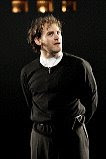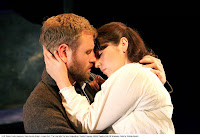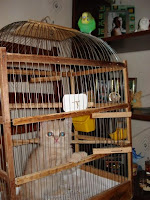
I first noticed Kerry Butler in the crazy Off-Broadway musical Bat Boy. She stood out there just as she has in all the shows I’ve seen her in since -- Prodigal, Hairspray and Little Shop of Horrors. For the last year she’s had a starring role on Broadway (and earned a Tony nomination) playing Kira/Clio in the zany musical Xanadu, and she’s every bit as winning as ever. (She also plays Reese on NBC's "Lipstick Jungle," which I’ve never seen.)
In May Ms. Butler released her debut solo recording, Faith, Trust & Pixie Dust, featuring 12 songs from the Disney canon. I didn’t know most of these selections because they are from movies that came out well past my days of going to Disney movies. The thought of an album of that kind of music wasn’t too appealing to me, but because I like the singer so much I gave it a try. While it’s not the kind of music I’d want to listen to often, I really enjoyed most of the selections, thanks to Ms. Butler’s interpretations. She provides a country spin to some and gives others a quirky playfulness.
In her liner notes she explains why she chose this brand of songs. “In thinking of songs that made me smile, or had a theme of hope or optimism that I felt was so important, I kept coming back to songs that were Disney-related. I love so many of the Disney themes -- when I’m sad or stressed, I know I need a dose of Disney.”
She studied hundreds of Disney songs and chose some standards, like “When You Wish Upon a Star,” which is my favorite on the CD because I like that song and love the jaunty arrangement with tuba, strings and ukulele. She picked others for personal reasons -- “Baby Mine” because she sings it to Segi, the daughter she adopted from Ethiopia in 2006, when she puts her to sleep. There’s even the first Disney song ever, “Minnie’s Yoo Hoo,” written by Walt Disney himself. The accompanying musicians and orchestration for all the songs are terrific.
She premieres two Alan Menken songs, “This Only Happens in the Movies,” written for an aborted prequel to “Who Framed Roger Rabbit?” and “Call Me a Princess,” written for an early version of “Aladdin.” The “Princess” song is so funny, especially with Ms. Butler’s impish spin. The refrain is “princesses get their way” and is all about princesses refusing to cook, “that’s not relaxing,” so they “make reservations.” They don’t bother to study, other than to study how to get money out of their fathers, and I loved “other girls work on a law degree, some scrub floors on their hands and knees, I’d rather have a facial, please.” It’s a great spoof of the prima donna mindset.
While I laughed at “Princess,” I was moved by her prayerful singing of "God Help the Outcasts" from "Hunchback of Notre Dame, which was suggested by several fans after Ms. Butler invited them to help pick one song for the recording.
The CD’s title comes from a lyric in Jonathan Brooke’s “I’ll Try,” a song from "Return to Neverland" about losing faith. “To believe in good, even when you see evil in the world, is something I struggle with,” Ms. Butler writes. “That’s what I love about ‘I’ll Try’ -- and about so much of the Disney catalog. It recognizes that it’s hard to have faith, it’s hard sometimes to ‘believe,’ and all you can do is make a choice to try.”
It is my great hope that Kerry Butler will sing for us one day at Broadway Blessing. I asked her for this year, but was told she already had plans for Sept. 8. As for next year, I’ll try.
































